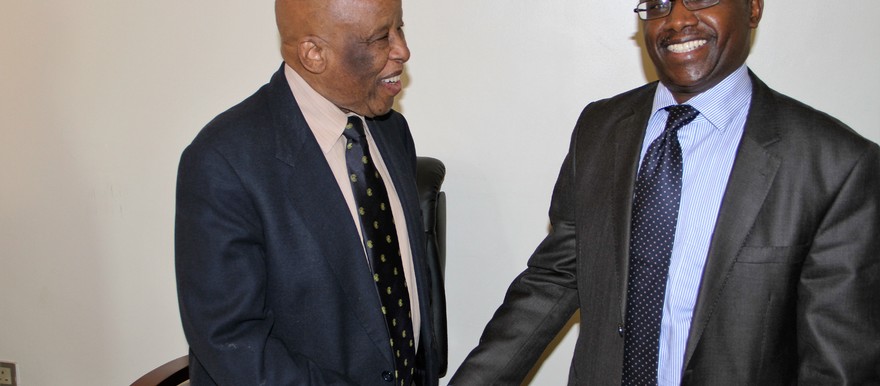The new chairman of the National Constitution Amendment Committee (NCAC) Gichira Kibara has expressed optimism that South Sudan will overcome difficulties in drafting an acceptable constitution.
Speaking after he met the Chairman of the Joint Monitoring and Evaluation Commission (JMEC) Festus Mogae, Kibara said he was delighted with the “pragmatic approaches to issues” even in such a fragile situation in the country.
Kibara, a distinguished Kenyan Constitutional lawyer, was appointed by the Intergovernmental Authority on Development (IGAD) and he is expected to kick-start the stalled process of the country’s constitutional review.
“So to some extent I have a sympathetic understanding of the kind of work we are dealing with. Situations change very fast. But the ultimate goal is to hold the country together as we engage in the process of longer term constitutional amendments.”
He made the remarks during a two-day visit to Juba where he met representatives of the parties to the agreement.
He will lead an 8-member committee that brings together representatives of the government of South Sudan (two), members of the armed opposition (two), former detainees (one) and representative of IGAD (two).
On his part, Mogae said that with the full reconstitution of the committee, the team is now expected to execute the “noble task and undertake its responsibilities, as required by the Agreement”.
“This assignment requires a great deal of patience. But, as always our crusade is an inclusive process for all the parties,” he said.
The NCAC was established under Chapter One, Paragraph 13 of the IGAD-led ARCSS peace agreement to spearhead constitutional amendments in the country.
The work of the committee was previously impeded by disagreements over several issues including the issue of the 28 States, vacancies of Members of Parliament, Chairing of the First Session of the expanded Transitional National Legislative Assembly, and appointment of presidential advisers.
Mr. Kibara brings to this position extensive legal and constitutional experience. He served as Kenya’s Permanent Secretary of the Ministry of Justice, National Cohesion and Constitutional Affairs, where he was in charge of overseeing constitutional development, legal reform, justice sector reform and sectoral coordination.
He also served as the Permanent Secretary and Director of Legal Affairs for Kenya’s Ministry of Justice and Constitutional Affairs, overseeing institutional development. He is an Advocate of the High Court of Kenya of more than 20 years standing. In addition to his work in the government, he has previously served as Executive Director of the Centre for Governance and Development (CGD) and Deputy Director of the Public Law Institute (PLI).
He has also served in various positions in civil society organizations such as chairman of the National Council of NGOs, chairman of the Board of the Legal Advice Center and member of the Board of Actionaid International Kenya.
Kibara has written and authored official reports on constitutional development, constitutional reform, justice sector reform, and electoral management.
He participated in the Former United Nations Secretary General Kofi Annan-led mediation process to reconcile and form the grand coalition government following Kenya’s disputed 2007/08 general elections.
He holds Masters of Law, University of South Africa-Pretoria and Bachelor of Laws-University of Nairobi. Other professional include Courses in Management (Kenya Institute of Management), Democracy in Diversity (University of Cape Town) and Leadership in Development (Harvard University).
“So far I am very happy with what I have seen but of course it is a bit premature to say I have understood the situation fully. So far I have seen good signs of progress,” Kibara said.




